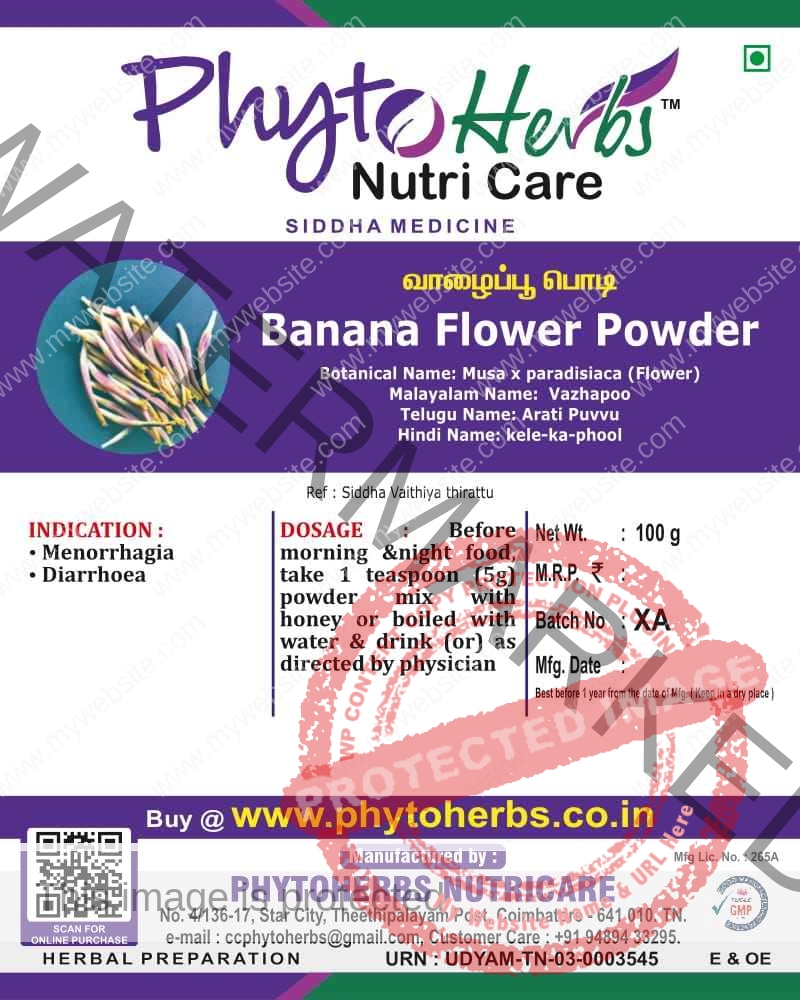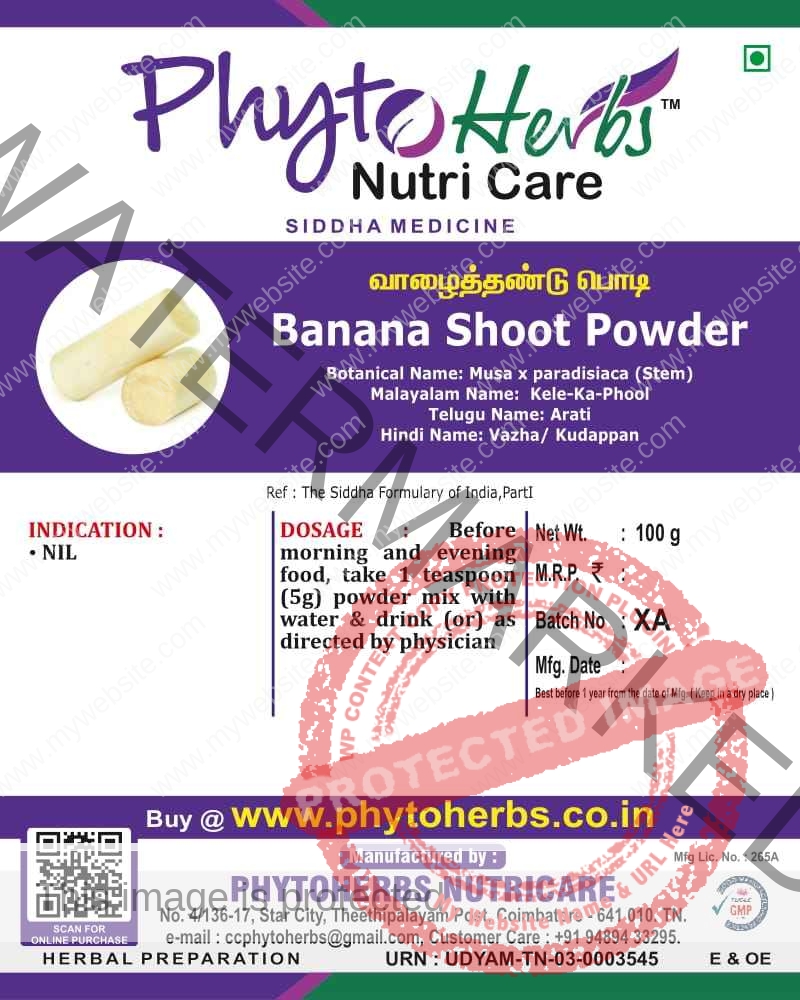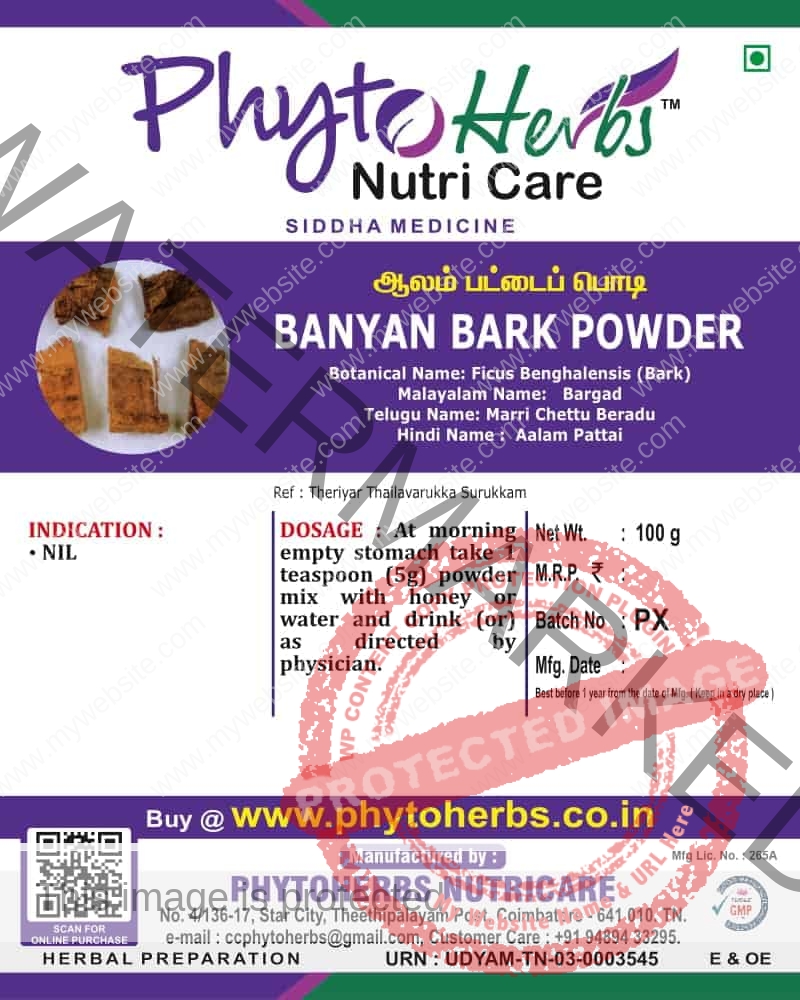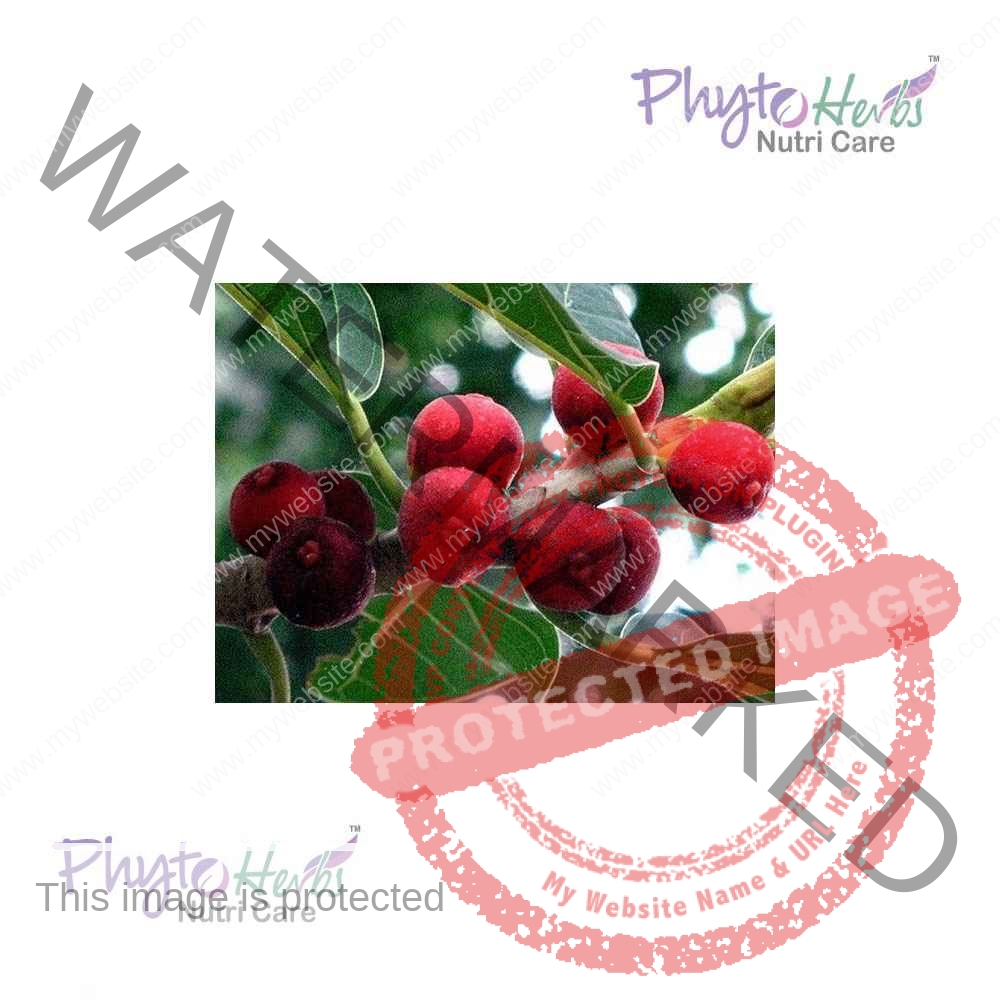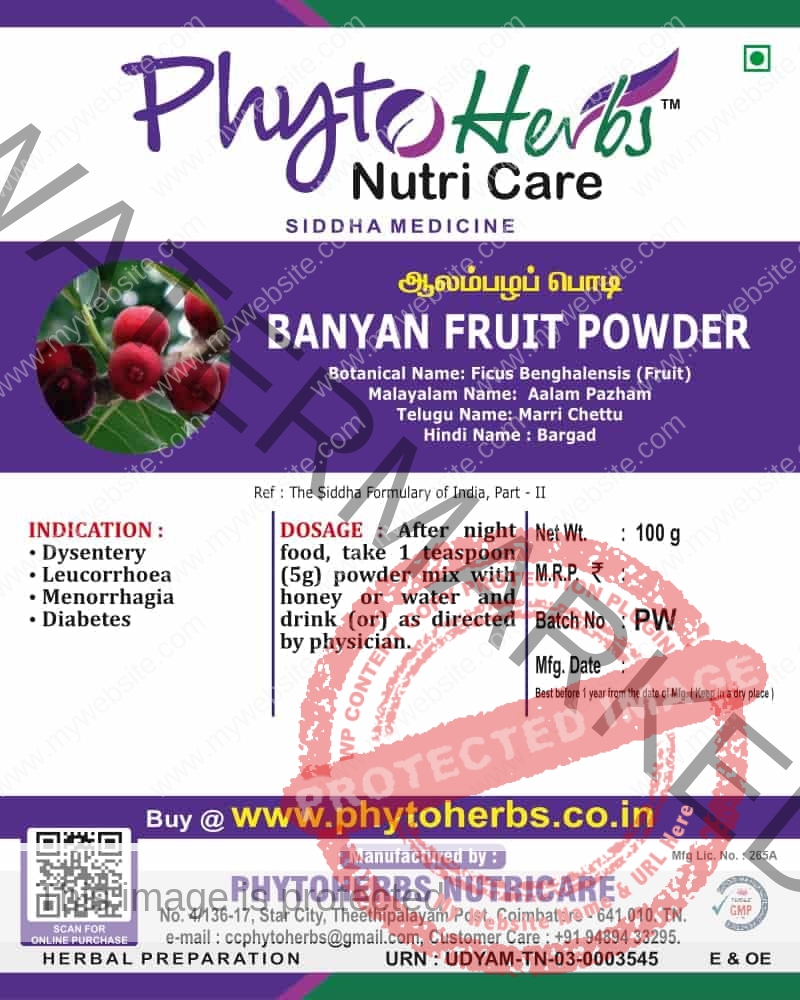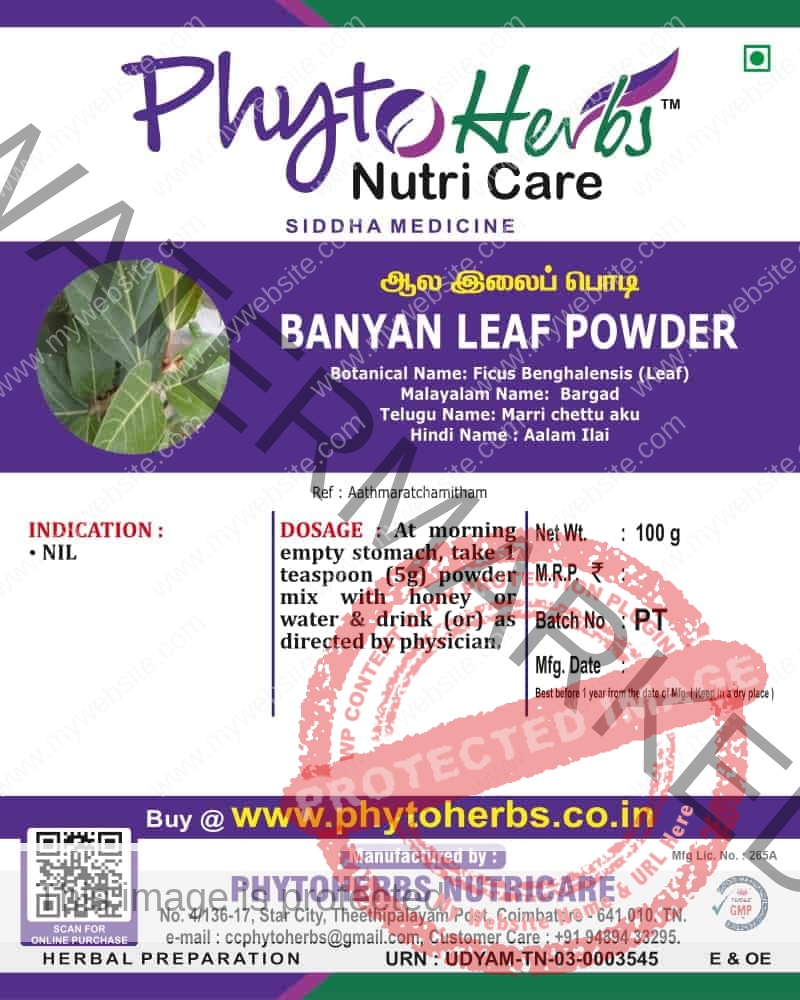Showing 13–24 of 275 results
Show filter-
Balloon vine Powder / முடக்கற்றான் பொடி
₹25.00Botanical Name: Cardiospermum halicacabum (Whole Plant)
Tamil Name: முடக்கற்றான் பொடி / Mudakkaththaan Podi
Malayalam Name: കറുത്തകുന്നി / Karuttakunni
Telugu Name: బుద్ధకాకర / Buddakakara
Hindi Name: कनफुटी / KanphuttiDescription: C. halicacabum belongs to family Sapindaceae and is commonly known as Balloon vine. Extract of this plant showed various medicinal properties such as antibacterial, antifungal, antiparasitic, antidiarrhoeal, anxiolytic, rubifacient, antipyretic, anti-inflammatory, anticonvulsant, and anticarcinogenic.
Pharmacological Properties: Cardiospermum preparations are used for the treatment of inflammatory dermatitis, hives, eczema, and insect bites. The active ingredients responsible for the cortisonelike effect are phytosterols that exhibit anti-inflammatory, moisturizing, sebum-regulating, anti-pruriginous, soothing skin redness, avoiding flaking activities. The antioxidant activity also manifests itself in relieving pain caused by arthritis and rheumatism. Due to their antioxidant power, it inhibits the action of the inflammatory enzymes and peroxilipids that damage the cells.
Dosage: After morning food, take 1 teaspoon (5g) powder mix with honey or boil with water & drink after filter (or) as directed by physician.
-
Banana Flower Powder / வாழைப்பூ பொடி
₹80.00 – ₹400.00Botanical Name: Musa x paradisiaca (Flower)
Tamil Name: வாழைப்பூ பொடி / Vaazhai Poo Podi
Malayalam Name: വാഴപ്പൂ / Vazhapoo
Telugu Name: అరటి పువ్వు / Arati Puvvu
Hindi Name: केले-का-फूल / kele-ka-phoolDescription:
Musa paradisiaca (Banana) is a monoherbacious plant belonging to the family Musaceae, distributed throughout the tropical and subtropical countries. The plant parts are widely used to treat different diseases in humans in traditional medicines, such as diabetes, diarrhea, dysentery, hypertension, hysteria, epilepsy, leprosy, hemorrhages, renal calculi and ulcers.
Traditional Uses: All parts of the Banana plant have medicinal uses. The flowers are used in treating bronchitis, dysentery, menorrhagia and ulcers. Cooked flowers are used to treat diabetes. The astringent plant sap is given in cases of hysteria, epilepsy, leprosy, fevers, hemorrhages, dysentery and diarrhea, and it is applied on hemorrhoids, insect and other stings and bites.
Therapeutic Uses: பெரும்பாடு (Menorrhagia), கழிச்சல் நோய் (Diarrhoea)Dosage: Before morning & night food, take 1 teaspoon (5g) powder mix with honey or boiled with water & drink (or) as directed by physician.
-
Banana Flower Powder / வாழைப்பூ பொடி
₹35.00Botanical Name: Musa x paradisiaca (Flower)
Tamil Name: வாழைப்பூ பொடி / Vaazhai Poo Podi
Malayalam Name: വാഴപ്പൂ / Vazhapoo
Telugu Name: అరటి పువ్వు / Arati Puvvu
Hindi Name: केले-का-फूल / kele-ka-phoolDescription: Musa paradisiaca (Banana) is a monoherbacious plant belonging to the family Musaceae, distributed throughout the tropical and subtropical countries. The plant parts are widely used to treat different diseases in humans in traditional medicines, such as diabetes, diarrhea, dysentery, hypertension, hysteria, epilepsy, leprosy, hemorrhages, renal calculi and ulcers.
Traditional Uses: All parts of the Banana plant have medicinal uses. The flowers are used in treating bronchitis, dysentery, menorrhagia and ulcers. Cooked flowers are used to treat diabetes. The astringent plant sap is given in cases of hysteria, epilepsy, leprosy, fevers, hemorrhages, dysentery and diarrhea, and it is applied on hemorrhoids, insect and other stings and bites.
Therapeutic Uses: பெரும்பாடு (Menorrhagia), கழிச்சல் நோய் (Diarrhoea)
Dosage: Before morning & night food, take 1 teaspoon (5g) powder mix with honey or boiled with water & drink (or) as directed by physician.
-
Banana Shoot Powder / வாழைத்தண்டு பொடி
₹80.00 – ₹400.00Botanical Name: Musa x paradisiaca (Stem)
Tamil Name: வாழைத்தண்டு பொடி / Vaazhai Thandu Podi
Malayalam Name: വാഴ / കുടപ്പൻ / Kele-Ka-Phool
Telugu Name: అరటి / Arati
Hindi Name: केले-का-फूल / Vazha/ KudappanDescription:
Musa paradisiaca (Banana) is a monoherbacious plant belonging to the family Musaceae, distributed throughout the tropical and subtropical countries. The plant parts are widely used to treat different diseases in humans in traditional medicines, such as diabetes, diarrhea, dysentery, hypertension, hysteria, epilepsy, leprosy, hemorrhages, renal calculi and ulcers.
Traditional Uses: All parts of the Banana plant have medicinal uses. The flowers are used in treating bronchitis, dysentery, menorrhagia and ulcers. Cooked flowers are used to treat diabetes. The astringent plant sap is given in cases of hysteria, epilepsy, leprosy, fevers, hemorrhages, dysentery and diarrhea, and it is applied on hemorrhoids, insect and other stings and bites. The roots are administered in digestive disorders, dysentery and other ailments. It also has anthelmintic property, blood disorders and venereal diseases.Dosage: Before morning and evening food, take 1 teaspoon (5g) powder mix with water & drink (or) as directed by physician.
-
Banana Shoot Powder / வாழைத்தண்டு பொடி
₹30.00Botanical Name: Musa x paradisiaca (Stem)
Tamil Name: வாழைத்தண்டு பொடி / Vaazhai Thandu Podi
Malayalam Name: വാഴ / കുടപ്പൻ / Kele-Ka-Phool
Telugu Name: అరటి / Arati
Hindi Name: केले-का-फूल / Vazha/ KudappanDescription: Musa paradisiaca (Banana) is a monoherbacious plant belonging to the family Musaceae, distributed throughout the tropical and subtropical countries. The plant parts are widely used to treat different diseases in humans in traditional medicines, such as diabetes, diarrhea, dysentery, hypertension, hysteria, epilepsy, leprosy, hemorrhages, renal calculi and ulcers.
Traditional Uses: All parts of the Banana plant have medicinal uses. The flowers are used in treating bronchitis, dysentery, menorrhagia and ulcers. Cooked flowers are used to treat diabetes. The astringent plant sap is given in cases of hysteria, epilepsy, leprosy, fevers, hemorrhages, dysentery and diarrhea, and it is applied on hemorrhoids, insect and other stings and bites. The roots are administered in digestive disorders, dysentery and other ailments. It also has anthelmintic property, blood disorders and venereal diseases.
Dosage: Before morning and evening food, take 1 teaspoon (5g) powder mix with water & drink (or) as directed by physician.
-
Banyan Fruit Powder / ஆலம் பழப் பொடி
₹30.00Botanical Name: Ficus Benghalensis (Fruit)
Tamil Name: ஆலம் பழப் பொடி / Aalam Pazha Podi
Malayalam Name: ആലം പഴം / Aalam Pazham
Telugu Name: మర్రి చెట్టు / Marri Chettu
Hindi Name: बरगद / BargadDescription: Ficus bengalensis, a genus of family Moraceae is a tropical, deciduous, evergreen tree of the mulberry family. F.bengalensis is known as common name Bargad and cultivated as a Garden tree or Spiritual tree. The active compounds isolated from this plant are considered to be very effective in various treatments such as dysentery, diarrhoea, diabetes, leucorrhoea, menorrhagia, nervous disorders, tonic and astringent. It widely used in diabetes in Ayurveda and Siddha system.
Dosage: After night food, take 1 teaspoon (5g) powder mix with honey or water & drink (or) as directed by physician.
-
Banyan Fruit Powder / ஆலம் பழப் பொடி
₹70.00 – ₹350.00Botanical Name: Ficus Benghalensis (Fruit)
Tamil Name: ஆலம் பழப் பொடி / Aalam Pazha Podi
Malayalam Name: ആലം പഴം / Aalam Pazham
Telugu Name: మర్రి చెట్టు / Marri Chettu
Hindi Name: बरगद / BargadDescription:
Ficus bengalensis, a genus of family Moraceae is a tropical, deciduous, evergreen tree of the mulberry family. F.bengalensis is known as common name Bargad and cultivated as a Garden tree or Spiritual tree. The active compounds isolated from this plant are considered to be very effective in various treatments such as dysentery, diarrhoea, diabetes, leucorrhoea, menorrhagia, nervous disorders, tonic and astringent. It widely used in diabetes in Ayurveda and Siddha system.Dosage: After night food, take 1 teaspoon (5g) powder mix with honey or water & drink (or) as directed by physician.
-
Banyan Leaf Powder / ஆல இலைப் பொடி
₹20.00Botanical Name: Ficus Benghalensis (Leaf)
Tamil Name: ஆல இலைப் பொடி / Aala Ilai Podi
Malayalam Name: ആലം ഇല / Bargad
Telugu Name: మర్రి చెట్టు ఆకు / Marri chettu aku
Hindi Name: अंजीर का वृक्ष / Aalam IlaiDescription: Ficus bengalensis, a genus of family Moraceae is a tropical, deciduous, evergreen tree of the mulberry family. F.bengalensis is known as common name Bargad and cultivated as a Garden tree or Spiritual tree. The leaves of F. bengalensis is used as ulcer protective, leprosy and fever, inflammations.The milky juice is aphrodisiac, tonic, vulnerary, maturant also useful in piles, diseases of the nose, gonorrhea. In Yunani the aerial root is used for styptic, syphilis, biliousness, dysentery, and inflammation of liver.
Dosage: At morning empty stomach, take 1 teaspoon (5g) powder mix with honey or water & drink (or) as directed by physician.
-
Banyan Leaf Powder / ஆல இலைப் பொடி
₹50.00 – ₹250.00Botanical Name: Ficus Benghalensis (Leaf)
Tamil Name: ஆல இலைப் பொடி / Aala Ilai Podi
Malayalam Name: ആലം ഇല / Bargad
Telugu Name: మర్రి చెట్టు ఆకు / Marri chettu aku
Hindi Name: अंजीर का वृक्ष / Aalam IlaiDescription:
Ficus bengalensis, a genus of family Moraceae is a tropical, deciduous, evergreen tree of the mulberry family. F.bengalensis is known as common name Bargad and cultivated as a Garden tree or Spiritual tree. The leaves of F. bengalensis is used as ulcer protective, leprosy and fever, inflammations.The milky juice is aphrodisiac, tonic, vulnerary, maturant also useful in piles, diseases of the nose, gonorrhea. In Yunani the aerial root is used for styptic, syphilis, biliousness, dysentery, and inflammation of liver.Dosage: At morning empty stomach, take 1 teaspoon (5g) powder mix with honey or water & drink (or) as directed by physician.
-
Bawchan Seed Powder / கார்போகரிசிப் பொடி
₹35.00Botanical Name: Psoralea corylifolia L.(Seed)
Tamil Name: கார்போகரிசிப் பொடி / Kaarpokarisi Podi
Malayalam Name: കാർക്കോകിൽ / Karkokil
Telugu Name: బావంచాలు / Bāvan̄cālu
Hindi Name: बकुचिओ / BakuchiDescription: Psoralea corylifolia (Bawchan) is an important plant in the Indian Ayurveda and Tamil Siddha systems of medicine, and also in Chinese medicine. The plant has been widely used in Ayurvedic, Siddha and Chinese medicine system as a cardiac tonic, vasodilator, pigmentor, antitumor, antibacterial, cytotoxic and antihelmenthic. The seeds of the plant possess greater medicinal value and are used in indigenous system of medicine as laxative, aphrodisiac, anthelminitic, diuretic and diaphoretic in febrile conditions. Oral administration and local external application of seeds in form of ointment or paste have been valued in Ayurveda and thus recommended in the treatment for leucoderma, leprosy, psoriasis, hair loss and inflammatory diseases of the skin such as eczema.
Dosage (Internal Use): As directed by physician. External Useage: In this whole 100g powder mix with 20g turmeric powder and take adequate mix with coconut oil and apply to the skin at morning and evening or as directed by physician.





